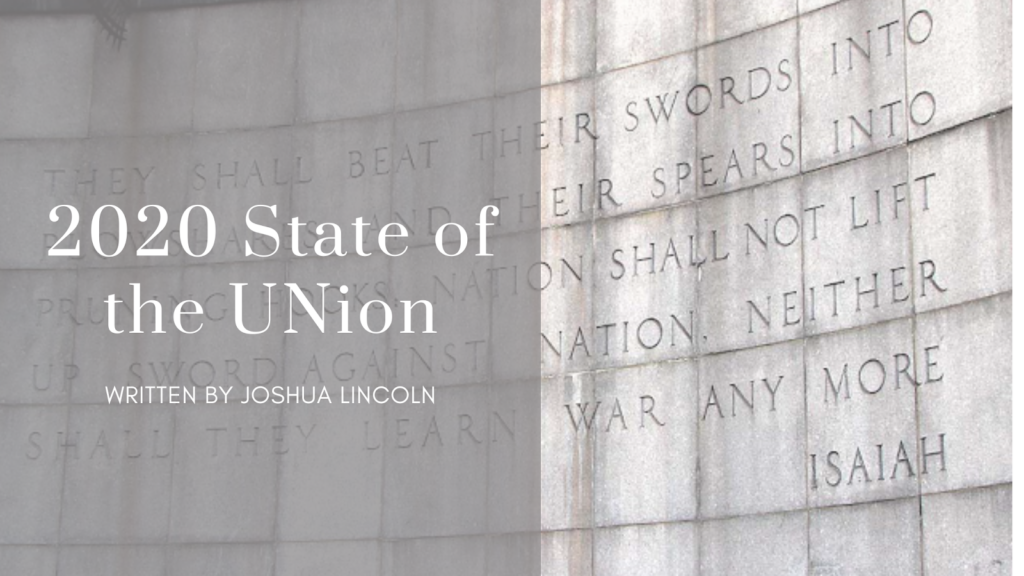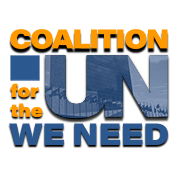Joshua Lincoln (PhD) is a senior fellow (non-resident) at the Fletcher School’s Center on International Law and Governance, and a member of the board of advisors of the Global Governance Forum. (follow him on Twitter at @joshualinco1n.)

On UN day (24 October) 2020, where do we stand in this most unusual year?
It has been a busy few months. On 9 October, the World Food Program was awarded the 2020 Nobel peace prize for doing one very important and very specific thing very effectively: delivering food to those most in need. This award highlights the enduring value of a narrow technical mandate within the wider UN ‘system’. But this is also the UN family’s 12th Nobel Peace prize in 75 years. At a moment where the historical performance and future value of the UN are up for examination, 12/75 is a strong data point.
Speaking of data, the high points of a truly ‘remote’ UN75 General Assembly were probably the release of Global Dialogue ‘Update’ Report (for enthusiasts, the Secretariat will share the data collected at year’s end, including by the Pew Research Center and Edelman Intelligence) and the adoption of the UN75 Political Declaration.
Three statistics already jump out of the commissioned Pew report. A median 59% of respondents from 14 countries believe greater international cooperation would have led to fewer Covid-19 cases in their country; 58% believe their country should take into account the interests of other countries even if it means making compromises; and 81% believe that countries should act as a part of a global community that works together to solve problems.
So much for realpolitik in a pandemic. In fact, solidarity is back, in a clear repudiation of 2020 go-it-alone-nationalism. Pew has been tracking global attitudes on the UN and international cooperation for a quarter-century so the strong 2020 popular support for the UN is neither new nor completely unexpected. But the depth of commitment to international cooperation inherent in the specific phrasing of these questions and their responses is new.
What is driving this? Pew has elsewhere documented a rapid acceleration in global public concern over climate change between 2013 and 2018. Across 23 countries, people who identified climate change as a major threat increased from a median 55% in 2013 to 67% by 2018, with some countries showing far greater acceleration (29 points for France, 28 for Mexico, 19 for the USA). Climate’s dramatic numbers remain constant since 2018 but it has now been joined by the pandemic. In a just-released separate survey comparing different ‘global threats’ across 14 countries, infectious diseases now rank almost as high (69%) as climate change (70%). The increased desire for meaningful international cooperation is probably fueled by a unique seven-year, one-two punch combination.
These figures suggest that a strong majority – the younger, the stronger – support broad, meaningful international cooperation, even if it is means ‘less’ for their own country. This basic outlook is not reflected in governmental behavior at the UN itself. The interesting conclusion therefore is not so much that the UN lacks support as it is that governments as a whole are increasingly out of step with their own populations on global cooperation.
This support is neither blind nor naive. While 61% agree that the UN ‘promotes action’ on both infectious diseases and climate change, only 53% believe it ‘cares’ about the needs of ordinary people, and only 51% believe it ‘deals effectively’ with international problems. This again would suggest a clear popular mandate for reform. The UN75 campaign caption was ‘The Future We Want, The UN We Need.’ Apparently, the future we want is one of meaningful international cooperation, and the UN we need is a more effective one we don’t yet have.
Which returns us to the UN75 Political Declaration adopted on 21 September. To the disappointment of many, it offered no ‘big bang’ structural reform or outright renewal. Yet such state-driven change would also be incoherent with the observed broader movement toward greater pluralism – multiple actors, at multiple levels, faced with multiple issues, in a multipolar order with no single hegemon to drive it. Governments are necessary but insufficient actors; whole-of-society change is increasingly the norm.
The path ahead therefore will likely draw on both the Dialogue and the Declaration. The Dialogue draws inspiration from the climate change movement and brings more voices to the table. The Declaration is overly general but universally agreed (what else was universally agreed in 2020?). It packages the 17 SDGs and more into 12 priorities and draws on existing tools like the Paris Agreement and Agenda 2030 even as COVID-19 rages. It offers civil society a document around which to coalesce, to demand action from governments individually and collectively, just as eyes turn to the recommendations requested of Secretary-General Guterres by next fall. Most importantly, it delineates a possible change path between tinkering and renewal: incremental, purposeful, inclusive, coherent, small-as-necessary steps on process and substance within an overall direction. This is no small challenge. But apparently, on this UN Day, We The People want no less.
